Travel & Outdoors
Laura Beth Resnick is Sowing Her Seeds at Butterbee Farm
The owner of the five-acre flower farm near Pikesville likes being her own boss.
It’s an otherwise quiet April afternoon, but Laura Beth Resnick is feeling a little frazzled. The owner of Butterbee Farm, a five-acre flower farm tucked down a side street of a Pikesville neighborhood, is usually cool and calm, but in the middle of the night—with the outside conditions hovering around freezing—an alarm went off warning that the temperature had dropped dramatically in one of the heated greenhouses. Resnick had to wait until the sun started peeking out to assess the damage to her treasured flora. Luckily, she says, flashing a relieved grin, “Everything is fine.”
Such is the life of a flower farmer. One off element—a temperature flux, a powdery mildew, too much rain, too little rain—can derail months of work. But that makes the victories all the sweeter. Walking her farm—past the rolling hills, beehives, vegetable garden, greenhouses, and hand-worked flower beds—she appreciates the beauty because she knows how much work goes into it.
Resnick grew up in Anne Arundel County, but her family moved here so she could attend the Friends School of Baltimore for high school. Even as a latecomer to the city, she felt an instant kinship. After high school, she continued her flute studies at a conservatory, but left before graduating—transferring to Barnard College to finish her undergraduate degree.
“I was feeling very lost,” says Resnick. “So I just kind of fell into farming because a friend of mine did it and I thought it sounded like fun.”
She also desperately needed something to fill that flute-sized hole. “I went through a period of loss,” she says. “I had worked for a really long time to become an outstanding performer, and when that didn’t feel right anymore, I just felt completely at sea.”
Resnick was also going through a chronic illness at the time—she’s since recovered—but all of those feelings needed an outlet. And it turned out farming was it.
“I just suddenly had this feeling that I’m doing something worthwhile.” She worked on farms in New Hampshire, Massachusetts, and Pennsylvania, and it was exactly what she needed. Resnick loved that you could see your actions have an immediate impact in real time.
“I JUST SUDDENLY HAD THIS FEELING THAT I’M DOING SOMETHING WORTHWHILE.”
“You plant a seed and the next day it sprouts, or you dig up a bunch of carrots and you wash them off and they’re beautiful and glistening and you’ve never tasted carrots that sweet,” she says wistfully. “You can see and feel how worthwhile you are in the world—that’s what got me hooked.”
At one point, Resnick realized she didn’t like the way the farm she was working for was being managed. So she decided to write her own business plan. To her surprise, she loved it.
“I got to think about my ideas and put them down on paper and play with different crop plans and different models.” And that was when she realized she was ready for her own place. “I think a lot of people start farming because they love gardening, and that’s all well and good and very useful, but I truly think that I came at it from the other direction. I actually like running the business and being my own boss, even more than I like growing.”
Resnick returned home to Baltimore, eager to get started.
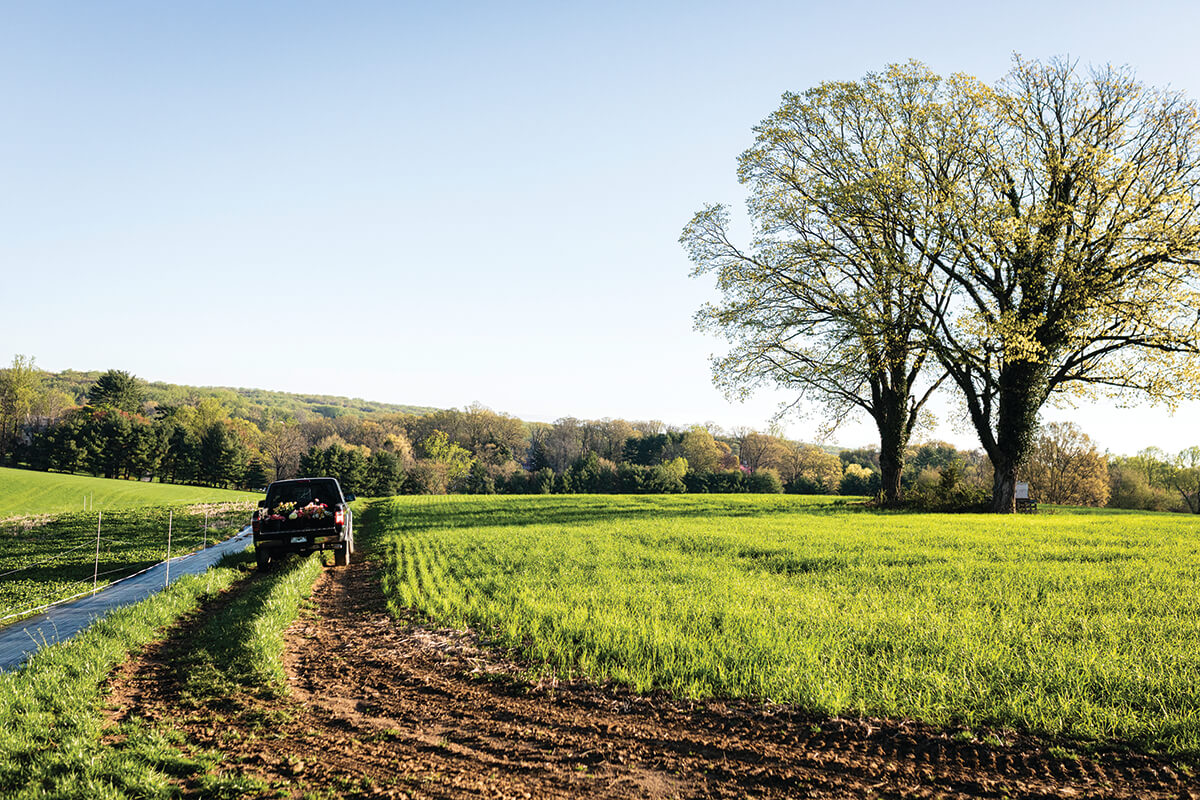
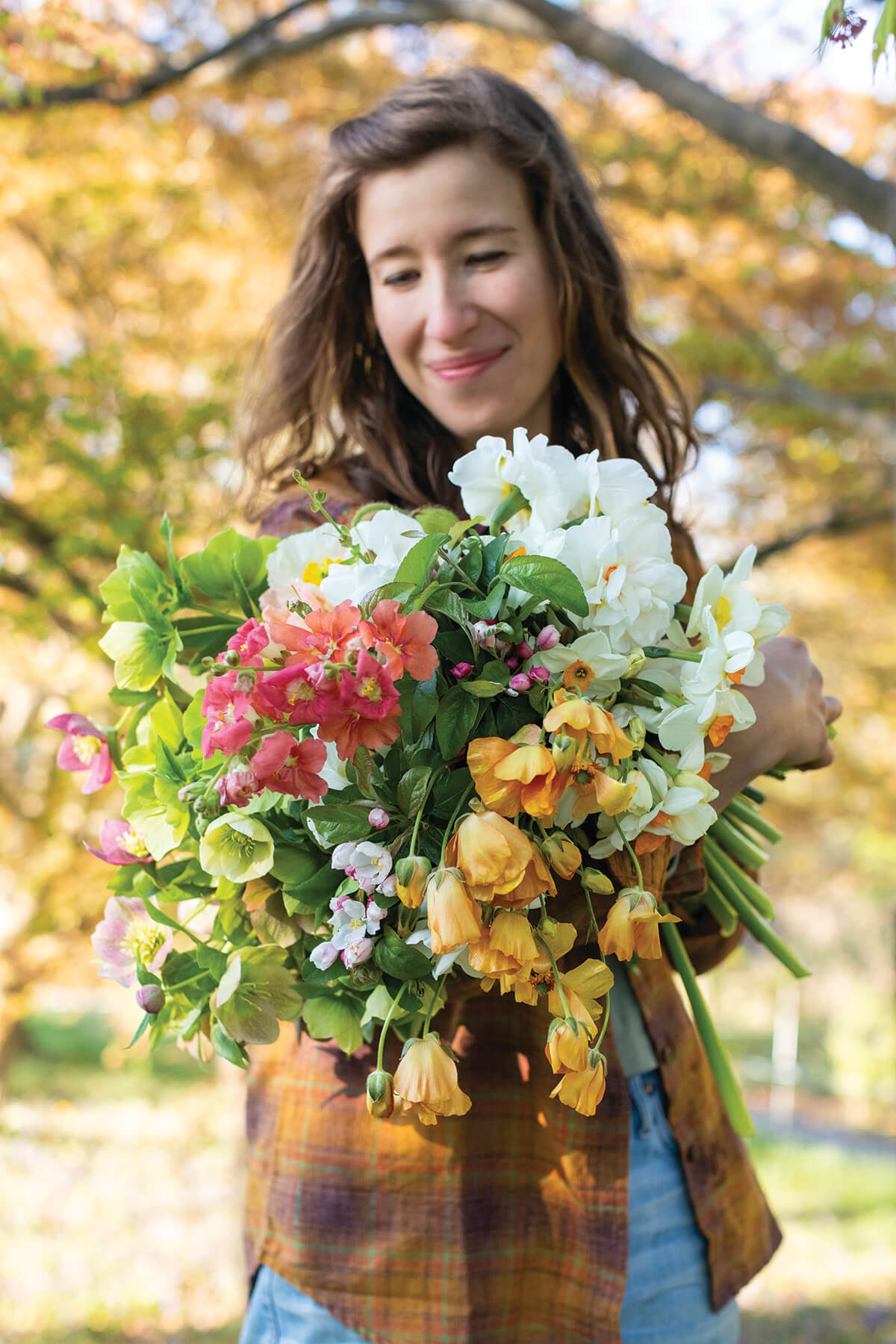
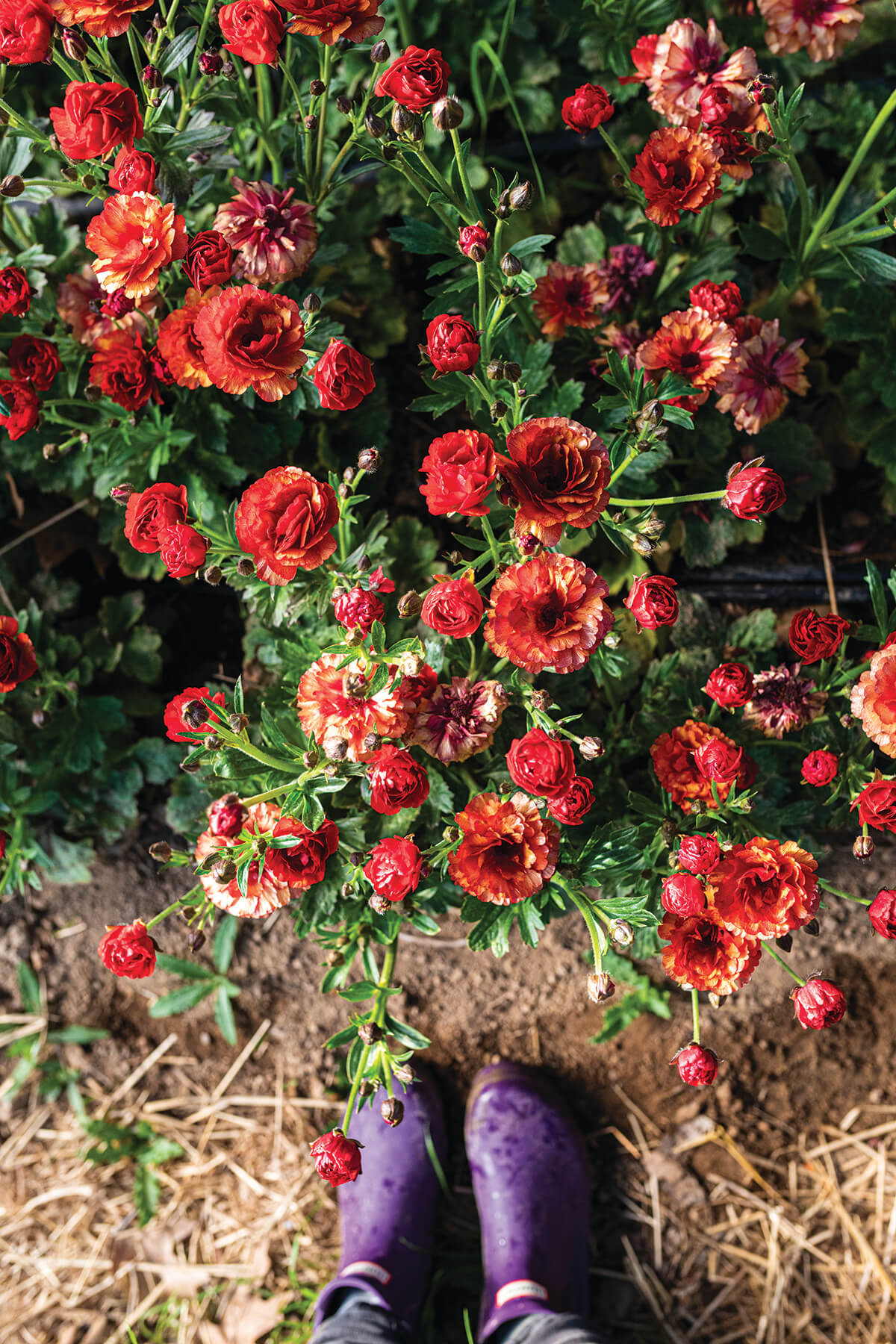
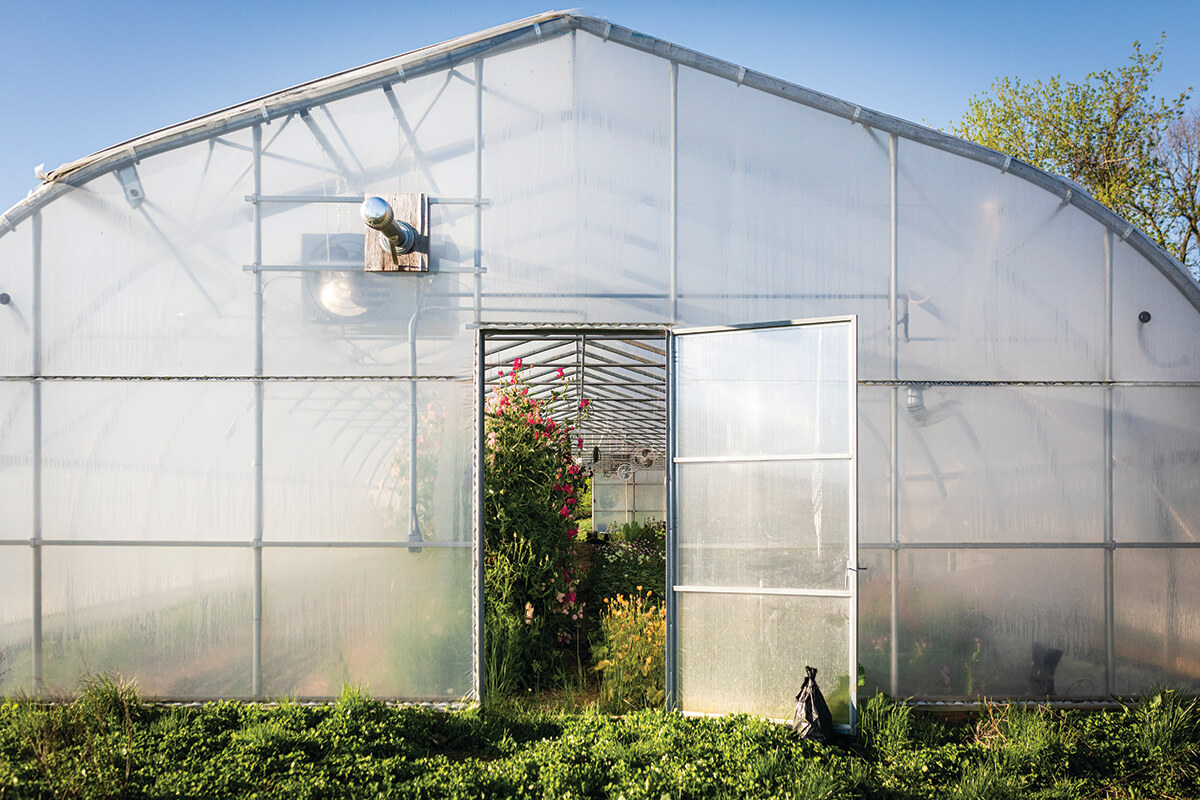
At the same time, she met Ellen Frost, owner of Local Color Flowers, a florist dedicated to sourcing only flowers from within 100 miles of Baltimore. Frost happened to be doing the flowers for Resnick’s sister’s wedding. At the consultation, they started talking about farming.
“I told her I had moved back to start a vegetable farm and I was looking for land,” says Resnick. “And she said, ‘Well, you should think about growing flowers. There’s a hole in the market, and there’s plenty of vegetable farmers around.’” That comment completely changed the trajectory of Resnick’s life.
“I said, ‘Okay, if you’ll buy everything, I’ll grow it.’” Frost is known for supporting new flower farmers, so Resnick didn’t hesitate to jump on board. Frost and a few other florists bought everything Resnick planted in her first two years so she could strictly concentrate on the mechanics of growing. It’s a partnership that has worked out really well for Frost.
“We pay growers for their flowers but also coach them in the way to sell to florists,” Frost explains. “How do you bunch things? What kind of buckets do you deliver in? The goal is that they are able to branch out and sell to other florists going forward.”
Frost also connected Resnick with the Maryland Cut Flower Growers Association, a group of farmers supported by the Maryland Department of Agriculture. The growers were all super experienced and “I definitely did not feel like it was appropriate to be like, ‘How do I flower?’” laughs Resnick.
Instead, she listened to high-level conversations, barely comprehending the content. But she paid attention, visited their farms, and learned to ask the right questions. Now Resnick sits on the board of the Association of Specialty Cut Flower Growers, a nonprofit dedicated to supporting flower farmers, and fields questions from novice growers with the same inquiries she had.
“I ACTUALLY LIKE RUNNING THE BUSINESS AND BEING MY OWN BOSS.”
After Resnick settled back in Baltimore, she visited with the sister of her high school boyfriend. “I stayed really close with his family,” she explains. She drove out to Alto Dale Farm, the family’s farmstead in Pikesville. “You should think about farming here,” the sister told Resnick. “I was like, ‘That seems like a terrible idea,’” Resnick laughs. “Family and business don’t mix.”
At the time, Resnick was farming on one thirteenth of an acre at Whitelock Community Farm in Reservoir Hill but was ready to feel more settled and expand her flower offerings. Resnick excitedly agreed to give it a shot and, in 2014, relocated her tiny Butterbee Farm, named after a character (a butterfly called Butterbee) in a bedtime story her dad use to tell her, to start leasing the farmland at Alto Dale.
Now, Resnick lives on the farm with her husband Jascha Owens (no, he’s not the ex-boyfriend), who works as the property’s groundskeeper.
Resnick and Owens, who graduated from MICA’s MFA painting program, met on OkCupid. On their first date, he helped her plant and weed for a few hours at her Whitelock plot and then, dressed in their dirty farming clothes, they had tea at Charmington’s. Years later, he reached through the truck window—she had just gotten back from a delivery—with an engagement ring and a bouquet of flowers. They were married in 2016 in her parents’ backyard. Resnick played the flute at her wedding and Frost did the flowers.
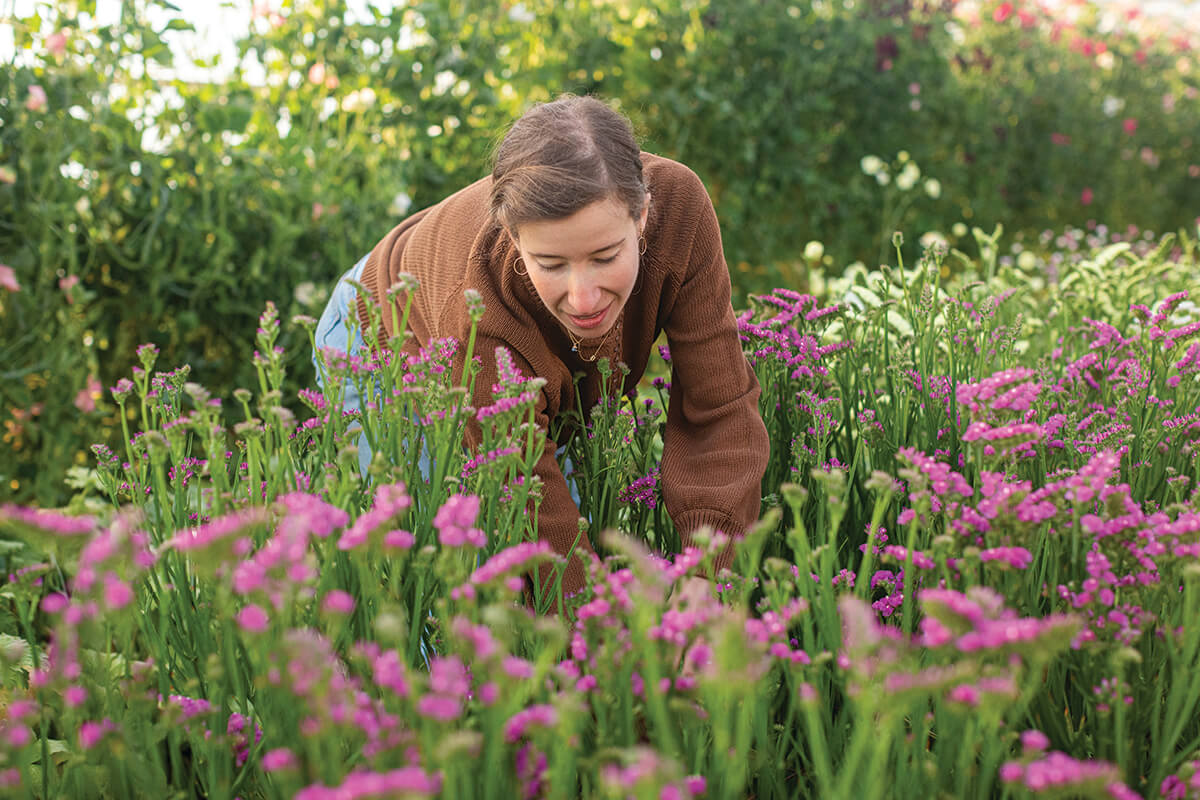
In her very first year, Resnick grew Celosia and flowering basil. Now there’s lilac, sweet pea, mock orange, peonies, hellebores, flowering quince, tulips, ranunculus, double daffodils, echinacea, nigella, statice, poppies, snapdragons, foxgloves, dahlias, and more.
Thanks to the two heated greenhouses on the property, the farm is pretty much able to grow year-round—which suits Ellen Frost just fine. She’d been trying for years to bring winter-grown flowers to the state. And she knew Resnick was just the woman to pull it off.
“She likes a challenge,” says Frost. “Winter growing was the perfect challenge for Laura Beth at this stage of her farming life.” She adds, “We share the same sort of passion for bringing local flowers to the community.”
Several times a week, Resnick and her team head out, her van packed with buds, and make deliveries to other flower shops in Baltimore, Washington, D.C., and Virginia. “We have so many close relationships, and it’s really my favorite thing and why I got into farming. I love being part of something with other people—it’s the best.”
Resnick hopes to see more people at the farm soon, too. She misses seeing neighbors, friends, and guests at the workshops, classes, and farm tours hosted pre-pandemic at Butterbee.
Despite the setbacks, the flowers keep growing. The work is backbreaking and exhausting, and being the boss is hard. There are occasionally tears, sunburns, and frustrations. But often, in the afternoon, after a 10-hour day, Resnick will walk down the gravel path to check the mailbox with Owens and Dell, the farm dog.
As she heads back toward the house, the sun bouncing off the trees that line the property, it will often hit her just how beautiful her life is.
“It’s so pretty here. I’m so lucky,” says Resnick. “And that feeling of gratitude counters all the hard things.”
